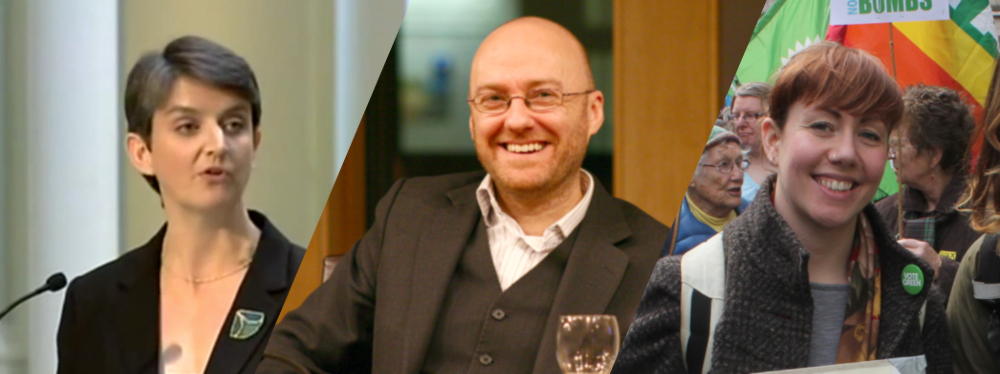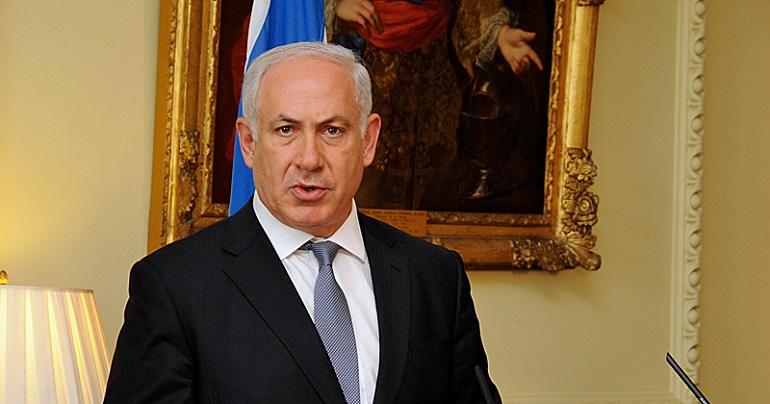Chapman / Harvie / Kitson : Exclusive Q&A with candidates for Convener of the Scottish Greens

Bright Green asked the three candidates for Co-convener of the Scottish Green Party 12 quick questions. Here’s what they had to say.
The basics
Maggie Chapman
Branch: Dundee & Angus
Experience: Party Co-convener since 2013, Councillor 2007-15, former Lead candidate for European Parliament
Other points of interest: Rector of Aberdeen Uni, represented Greens on Smith Commission, Vice-President of ULA union
Patrick Harvie
Branch: Glasgow
Experience: MSP for Glasgow since 2003, Party Co-convener since 2008
Other points of interest: E–Politician of the Year in 2013, spoke for the Greens in 2015 STV debates, serial faslane blockader
Zara Kitson
Branch: Glasgow
Experience: Glasgow & West of Scotland branch Co-convener, former Co-convener of the Scottish Young Greens
Other points of interest: key roles in National Collective and of So Say Scotland, Committee member of Women for Independence
Some personal questions
1. When did you join the Scottish Greens and why?
Patrick: I was sitting in the corner at branch meetings at the age of five or six, when my Mum was an activist! As an adult, I joined during the Section 28 campaign in around 2000.
Zara: 2011, after challenging politicians to tackle the growing gap between rich and poor, and Mark Ruskell recognising my passion – inviting me to ‘get involved, and take a generation with you’.
Maggie: In 2004: it’s the only party which shares my hope for a just, welcoming, sustainable and truly democratic Scotland.
2. What would make you join a different political party?
Zara: My values are Green. I would only leave the party, if the party left me.
Maggie: If the party went back on its core principles: peace, radical democracy, social justice, equality and environmentalism, and another grew up to replace it. Which seems unlikely!
Patrick: I can’t think of anything that would make me join anything other than a Green Party.
3. Does class still matter in politics?
Maggie: Of course class still matters! Inequality is reaching Victorian levels, and austerity is class war by another name. Other things – gender, race, sexuality, the environment, etc. – matter too. And they all interrelate. We can’t solve the world’s problems by only tackling one of these alone.
Patrick: Yes, but it means something very different to what it meant in previous generations.
Zara: Yes. It matters that we tackle poverty and create a level playing field, and it matters that while inequality exists, we support those from working class and disadvantaged backgrounds to speak at the highest political level.
4. Pick a word and say something about it: socialism, deep-green, anti-capitalism, liberalism, anarchy, revolution, Corbyn.
Patrick: Anti-capitalism isn’t enough. What I think makes the Greens distinctive is the willingness to explore new economic ideas which are already rising as capitalism increasingly fails, instead of pretending that old answers are still adequate.
Zara: Corbyn. The demonisation of those who dare to be anything other than far to the right wing is a reminder of the need to hand not just power to the public, but also the media, to hold power to account.
Maggie: Socialism isn’t a dirty word: if properly understood and applied to the modern world, it’s the way forward.
Quick fire policy
5. Who should own and control the economy?
Zara: The economy exists to serve the people. Instead of an endless obsession with GDP we need government to assess how an economy makes people happier and more equal. Public goods should be in public hands, and we need a network of smaller banks with local accountability.
Maggie: The economy should be owned and controlled much more democratically: through worker and consumer co-ops, mutuals, (much more local) local authorities and, in some cases, the government.
Patrick: The economy isn’t just one thing, so there isn’t just one answer! Public and community ownership (in many forms) should play a much bigger role. Far too many sectors are dominated by a tiny number of giant businesses, when we could see the flourishing of vast numbers of small ones.
6. Do we talk enough about the environment?
Maggie: It was important to break out of the eco-box that the media liked to put us in. Now we’ve started to do this, we need to find ways to talk about the environment which locate responsibility firmly where it should be: with big business and the rich men who run the world. Fracking campaigns do that brilliantly.
Patrick: It’s how we talk about it that matters, not just how much. It is integral to Green politics, not a separate topic. We need to show how respecting environmental limits will be positive for quality of life, social justice, health and humanity.
Zara: We talk about the environment, but we strive to connect it up with other policy areas, like health, education or justice, to make sustainable policies meaningful for people from all walks of life.
7. How quickly would you like to see Scotland gain its independence?
Patrick: It would be a mistake to rush to another vote before we’re sure the argument is won amongst many of 2014’s No voters.
Zara: Personally – immediately. I was disappointed that the power to even call a referendum wasn’t devolved. Independence should be debated again whenever the public choose. Until then we must recapture the positivity of the Green Yes campaign.
Maggie: Independence, for me, was always a means to an end: about social justice and democracy. I’ll take independence tomorrow if it means workers control our businesses, communities control our public services, and people control our politics. We have to build our independence and the socially just Scotland that must come with it.
8. Should Jenny Jones leave the house of Lords?
Zara: I’m disappointed to see a Green there, but as a separate Party, that’s a matter for GPEW. I endorse SGP members’ decision to refuse Lords’ seats if ever offered.
Maggie: That’s for the Green Party of England and Wales to decide. I oppose an unelected chamber, and I proposed the motion saying Scottish Greens shouldn’t have members of the House of Lords.
Patrick: I think one good option for GPEW, if they don’t oppose participation in the Lords, would be to hold open public votes to decide which of their candidates will take seats, and to challenge all parties which say they want a democratic parliament to do the same.
Organising the party
9. What is the biggest challenge facing the party and how would you address it?
Maggie: Diversifying and reaching beyond our bubble. I’ve always encouraged the party to talk about policies which directly link our ideas to people’s daily lives – like the living wage and opposing the outsourcing of social care. That’s how I got to represent the most diverse ward in Scotland. I’ll keep doing that.
Patrick: Building shared expectations amongst members new and old, about how we adjust to being the size we are and how we create a more considerate and supportive culture.
Zara: Improving internal structures to ensure support for branches and members. I have benefited from the insights shared with me from members new and old around Scotland, and I am committed to continue working closely with all branches ahead of the Holyrood elections.
10. What other political groups should Scottish Greens work with and how?
Patrick: We’ve always been able to find opportunities to work with others on the common ground instead of only focusing on differences. Some political traditions have a track record of tribalism or factionalism. It’s important that we don’t follow that path, and equally important that we don’t lose our own distinctive identity.
Zara: As a top priority, SGP must strengthen links with trade unions, particularly as we are the only Party in Holyrood offering support for those choosing non-compliance with anti-worker legislation.
Maggie: I’m a pluralist. I support collaboration with as many groups as possible across the left. One of our biggest successes during the Yes campaign was showing we were able and willing to work cooperatively.
11. As Caroline Lucas did in England & Wales, is there a case for Co-conveners stepping back if they enter parliament?
Zara: With two co-cos we have more capacity, so I think the only issue is who is best for the role.
Maggie: There’s a case for it – it worked well in England & Wales. I’d happily discuss it with the party if I become an MSP.
Patrick: There would be positives and negatives from this. It will always be important that those who have high profile positions are chosen at some level by the members, so if we went down that route we’d need to create some other elected role.
12. Anything else you want to say?
Maggie: See http://maggiechapman.wordpress.com for more about my proven track record, experience and enthusiasm.
Patrick: Many thanks for offering us candidates this platform.
Zara: Having an election in the spirit we are doing is great – it feels really energising and we’ve had some great feedback about how people perceive it as a sign of our development. Whatever happens, the Party is benefitting.
- Zara and Maggie are candidates for the position of “Female Co-convener” and Patrick is the unopposed candidate for “Male Co-convener”. Voting in internal elections ends at noon on Thursday 26 November 2015 and must be done using secure information sent to members by post or email.




Leave a Reply